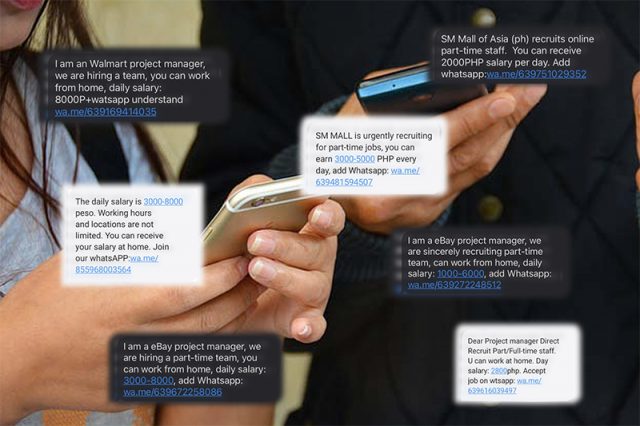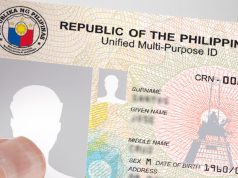Several Filipinos reported that they have been receiving text messages about sketchy job offers that promised high salaries in the past few days.
They aired these complaints by sharing screenshots of these messages on social media.
The online users also suspected that their phone numbers might have been leaked from contact tracing forms and apps required when entering establishments.
“What did we get from all those contact tracing forms? Random recruitment text messages that are most likely scams (eyeroll emoji),” another Twitter user wrote.
“My phone number for contact tracing is now flooded with spam text. Reason you can’t trust the government or anyone with your information,” editor Jing Garcia said.
Blogger Noemi Dado was among those who shared screenshots of the messages she received.
“Ugh so many spam text messages on making money. Did they get my number from contact tracing?” she asked.
Ugh so many spam text messages on making money . Did they get my number from contact tracing ? pic.twitter.com/HuzR2biWc8
— Noemi L. Dado (@momblogger) November 17, 2021
Screenshots showed that the messages being sent were offerings of high salaries for work-at-home or part-time jobs.
Senders are asking the recipients to visit links to avail of the work. Most of them were links to a WhatsApp channel.
One of the messages read: “Earn P300 to P1,500 a day. You can earn money by working part-time at home with only a mobile device.”
Media reporter Jules Guiang also shared that he received at least ten texts from random numbers recently.
“Sobrang disturbing na nakakatanggap ako ng at least 10 messages from random numbers offering job opportunities or mga for sale na products. Pre-pandemic wala namang ganito. Mukhang sa ibang paraan ata nagamit ang contact tracing? Kayo rin ba nakakatanggap?” Guiang said.
He attached copies of some of these texts under his tweet.
They offered similar details of a part-time position with P2,000 and above pay.
— Jules Guiang (@julesguiang) November 15, 2021
Photographer Jilson Tiu, meanwhile, voiced out that the texts he got seemed to be sent out by Chinese bots.
Whoever sold our contact tracing information, I hope the Universe snaps back at you. I’ve been getting constant and annoying text like this by bot and I guess these are Chinese bots, because they always starts with “dear or friend” in Alibaba. pic.twitter.com/vNUFiyPeqX
— Jilson Tiu (@jilsonstiu) November 19, 2021
Others decried that giving out their personal numbers is a violation of their data privacy rights.
“I’ve been getting a lot of SMS offering a lot of stuff, #NTC should be looking into this seriously. I assume they got my number from contact tracing forms. Baka binebenta na data natin. #DataPrivacy,” one user said.
NPC’s response
When sought for a comment on these reports, the National Privacy Commission stated that they are currently investigating the increase in unsolicited SMS texts.
Roren Chin, chief of NPC’s public information and assistance division, said through Viber that NPC have no sufficient information yet on these incidents.
“We are looking at these reports but no sufficient information, at this time, to attribute or link the growing concerns on unsolicited SMS to scraping or breach of contact tracing forms/apps. We are also conducting privacy sweeps to check the compliance to DPA requirements,” Chin said.
“’Privacy Sweep’ refers to a mode of Compliance Check. with respect to its obligation under the DPA, and its related issuances based on publicly available or accessible information, such as, but not limited to, websites, mobile applications, raffle coupons, brochures, and privacy notices. This is the initial mode of Compliance Check,” she added.
Any type of personal information should be protected under the Data Privacy Act of 2012.
In Section 3, personal information is defined as “any information whether recorded in a material form or not, from which the identity of an individual is apparent or can be reasonably and directly ascertained by the entity holding the information, or when put together with other information would directly and certainly identify an individual.”
The act of sending spam or unsolicited text messages, on the other hand, is prohibited under the Cybercrime Prevention Act of 2012.
In section 4, it was stated that:
“The transmission of commercial electronic communication with the use of computer system which seeks to advertise, sell, or offer for sale products and services are prohibited.”










